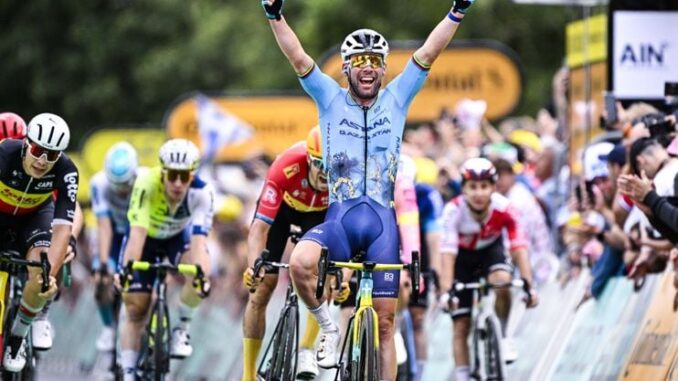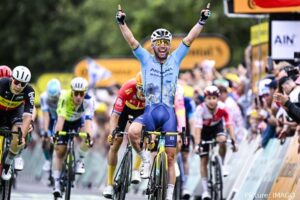
“It Was Talked About Because It Didn’t Seem Possible” – Mark Cavendish Reflects on Breaking Eddy Merckx’s Tour de France Stage Win Record
In the world of professional cycling, there are records that seem untouchable, achievements so monumental that they transcend time and generations. For decades, Eddy Merckx’s record of 34 stage wins in the Tour de France was one such benchmark—an untouchable feat that stood as a testament to the Belgian legend’s unparalleled dominance in the sport. However, in the summer of 2021, a rider from the Isle of Man named Mark Cavendish did the unthinkable: he matched Merckx’s record and then, a year later, broke it. Reflecting on this remarkable achievement, Cavendish’s words capture the disbelief, the struggle, and the sheer persistence that defined his journey to cycling immortality: “It was talked about because it didn’t seem possible.”

The Early Years: A Rising Star
Mark Cavendish’s journey to becoming the most successful sprinter in Tour de France history began humbly on the small island of the Isle of Man. From a young age, it was clear that Cavendish had a natural talent for cycling, especially sprinting. His early career was marked by a series of impressive performances in track cycling, where he won multiple world titles in the Madison and Omnium disciplines. However, it was on the road, particularly in the high-stakes environment of the Tour de France, that Cavendish would make his most significant mark.
Cavendish’s first Tour de France stage win came in 2008, during his debut in the race. At the age of 23, he took the peloton by storm, winning four stages with his trademark explosive sprints. His ability to find the perfect position in the final meters of a stage, combined with his raw speed and tactical intelligence, made him a force to be reckoned with. The cycling world took notice, and it became clear that Cavendish was a once-in-a-generation sprinter. But even then, few could have predicted that this young rider would one day challenge Merckx’s seemingly insurmountable record.
The Journey to 34: Triumph and Tribulation
Over the next few years, Cavendish became the dominant sprinter in the Tour de France. From 2009 to 2011, he won a staggering 15 stages, including a memorable victory on the Champs-Élysées in 2009, which would become a hallmark of his career. By the end of the 2011 Tour, Cavendish had accumulated 20 stage wins, placing him firmly among the greatest sprinters in the history of the race.
However, the path to 34 stage wins was not a linear one. The years following 2011 were marked by both triumph and adversity. Cavendish continued to win stages in the Tour de France, but injuries, illness, and team changes began to take their toll. Between 2014 and 2019, he managed only three stage wins in the Tour, a far cry from his earlier dominance. In 2017, he suffered a serious crash that resulted in a broken shoulder blade, forcing him to withdraw from the Tour. The following year, he was diagnosed with the Epstein-Barr virus, which severely impacted his performance and led to a period of uncertainty about his future in the sport.
During these challenging years, Cavendish’s prospects of breaking Merckx’s record seemed increasingly unlikely. The cycling world began to doubt whether he could ever return to his former glory. But Cavendish’s determination never wavered. In interviews, he spoke openly about his struggles and the mental toll they took, but he also emphasized his unwavering belief that he could still compete at the highest level.
The Miraculous Comeback
Cavendish’s resurgence in 2021 is the stuff of legend. After struggling for years with health issues and a lack of form, Cavendish returned to the Tour de France with Deceuninck-QuickStep, a team known for its strong support for sprinters. Few expected him to add to his tally of stage wins, let alone challenge Merckx’s record. But in one of the most remarkable comebacks in cycling history, Cavendish defied the odds.
During the 2021 Tour, Cavendish won four stages, equaling Merckx’s record of 34. His victories were not just a testament to his sprinting prowess but also to his resilience and determination. Each win was met with emotional celebrations, both from Cavendish and his teammates, who recognized the magnitude of his achievement. The cycling world watched in awe as Cavendish, once thought to be past his prime, delivered one of the most memorable performances in the history of the Tour.
Reflecting on this period, Cavendish acknowledged the disbelief that surrounded his comeback: “It was talked about because it didn’t seem possible. I think that’s what made it special—nobody, including myself at times, believed it could happen. But the support I received from my team, my family, and the fans kept me going.”
Breaking the Record: A New Chapter in Cycling History
In 2022, Cavendish returned to the Tour de France with one goal in mind: to break Eddy Merckx’s record. The pressure was immense, but Cavendish, as he had done throughout his career, rose to the occasion. In a nail-biting sprint finish on Stage 4, he crossed the line first, securing his 35th Tour de France stage win and etching his name in the record books.
The significance of this moment was not lost on Cavendish. After crossing the finish line, he was visibly emotional, overwhelmed by the realization of what he had accomplished. “To break a record held by someone like Eddy Merckx is something I never thought I’d do,” Cavendish said. “He’s one of the greatest cyclists of all time, and to even be mentioned in the same breath as him is an honor.”
Cavendish’s record-breaking win was celebrated across the cycling world, with tributes pouring in from fans, fellow riders, and legends of the sport. Even Eddy Merckx himself congratulated Cavendish, acknowledging the historic nature of his achievement. For Cavendish, the win was not just about the record; it was a culmination of years of hard work, perseverance, and a refusal to give up, even when the odds were stacked against him.
Legacy and Impact
Mark Cavendish’s journey to becoming the all-time leader in Tour de France stage wins is a story of resilience, determination, and the pursuit of excellence. His record-breaking achievement has cemented his status as one of the greatest sprinters in the history of the sport and has inspired countless riders who aspire to reach the pinnacle of professional cycling.
Cavendish’s impact goes beyond the numbers. He has brought excitement and drama to the Tour de France, thrilling fans with his breathtaking sprints and charismatic personality. His ability to overcome adversity, whether it was injury, illness, or the pressure of expectation, has made him a role model for athletes across all sports.
As Cavendish reflects on his career, he does so with a sense of pride and fulfillment. “I’ve had an incredible journey in cycling,” he said. “There have been highs and lows, but I wouldn’t change a thing. Every win, every setback, has shaped who I am today. Breaking the record was a dream come true, but the journey to get there is what I’ll always remember.”
Looking ahead, Cavendish’s legacy will continue to inspire the next generation of cyclists. His story is a reminder that in the world of sports, nothing is impossible. With determination, hard work, and a belief in oneself, even the most unbreakable records can be shattered.
In the end, Mark Cavendish’s reflection on breaking Eddy Merckx’s Tour de France stage win record is not just about the achievement itself, but about the journey—the challenges, the perseverance, and the relentless pursuit of greatness. “It was talked about because it didn’t seem possible,” Cavendish said, but in his case, the impossible became reality, and the world of cycling will never forget it.
Leave a Reply